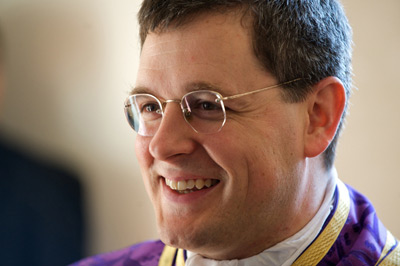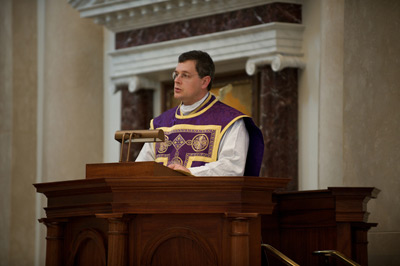When John Berg arrived at Thomas Aquinas College in the fall of 1989, few would have considered him a likely candidate for the office of Senior Class Speaker four years later. So limited was his understanding of the program on which he was to embark (“I thought an education meant preparing to get a job”) and of the community in which he was to live (“I thought being Catholic meant going to Mass on Sunday”) that chances were slim he would be a suitable spokesman for his fellow seniors at Commencement. Nevertheless, in the spring of 1993, his friends and classmates did elect him to speak for them. For in the intervening years, John had come to possess, more than most, the intellectual and moral virtue to which they all aspired.
A Transformation of Mind and Heart
Born in Minneapolis, Minnesota, John was one of four children. As he recalls, “Though I was raised a Catholic, attended Catholic schools, and practiced the Faith, I was not serious at all about my religion.” When his father presented the opportunity to attend Thomas Aquinas College, John resisted, thinking the then-small school with its temporary trailers “just a little too crazy.” He opted instead to attend a large Catholic university in his home state where he would study physics. But it was not long before he found the classroom experience simply too dry. Hoping to be more engaged by the discussion-method classes at the College, he applied and was accepted. Even then, though, the College’s unabashedly Catholic character held little interest for him.
In the course of the next four years, however, John found that not only did his knowledge grow exponentially, so also did his faith. “The College passes on the Faith through uniting it with reason,” he would later say in his Commencement talk. “This rational explication and defense of the doctrines of the Church … were for many of us the first attempt we had ever seen made to defend many doctrines…. The Faith — for the first time, perhaps — could be seen as something coherent, reasonable, and defendable.”
But knowledge alone was not sufficient for the conversion within the Faith that John experienced. As Bl. John Henry Cardinal Newman once said, “It is persons which influence us, voices which melt us, and deeds which inflame us. We are not converted by syllogisms.” In the chaplains at the College, the tutors, their wives, and in the upper-classmen, John found just such examples, numerous models of self-sacrifice — of how to live the Faith — and they inspired him to want to do the same.
Discerning a Vocation
During the course of his junior year, John began to hear God’s call and to desire “a future in which he would give all to God.” At the same time, through his studies of St. Thomas Aquinas’ Summa Theologiae, his understanding of the sacraments and the role of priests as “dispensers of the mysteries of God” (1 Cor. 4:1) increased. So, also, did his love for the Mass, especially what was then called the Old Rite of the Mass.
“At first,” he recalls, “I would tell a friend of mine that I would be a diocesan priest, where the battle really was. He would argue that most did not offer very good formation, but I would say that I would survive.… In the end, however, I realized I was too weak; I needed the Old Mass, now called the extraordinary form. I needed all of the support this form offers. It is rich in prayers and gestures and rules, and is made for those who need the extra help to be well prepared for the graces of the Sacrament.”
John was attracted to this new order by its three pillars: its attachment to the See of Peter, as its name betokens; its dedication to the extraordinary form of the Mass and all the sacraments, in parish settings; and its emphasis on the thought of St. Thomas Aquinas as a clear basis for presenting the Faith to believers and unbelievers alike in the modern world. He, therefore, sought entrance to the Fraternity, was accepted, and began his preparation for the priesthood during the summer of 1993, just after graduating from the College.
Path to the Priesthood
John spent his first year of spirituality in the Fraternity’s new seminary in Scranton, Penn. Having already fulfilled the philosophy requirement at the College, he was sent for the next two years to study theology in Wigratzbad, Germany. He then spent three years completing his theological studies at Santa Croce, the Opus Dei seminary in Rome, receiving a pontifical licentiate in theology. During this time, he was ordained to the priesthood and did some pastoral work as the first chaplain for the Fraternity’s church in Rome, San Gregorio dei Muratori.
Fr. Berg returned to the United States in 2000 to teach dogmatic theology for a year at the Fraternity’s North American seminary, after which he was assigned for the next five years to the parish of St. Stephen the First Martyr in Sacramento, Calif. One of the parishioners, it turned out, was his former tutor and the founding president of Thomas Aquinas College, Dr. Ronald P. McArthur.“Imagine what it was like,” he says, “to give sermons, knowing he was in the congregation!”
A Tremendous Responsibility
Fr. Berg now lives in the order’s general house in Fribourg, Switzerland. He has in his care over 200 priests and 120 seminarians, who serve the Church in over 100 dioceses worldwide. They are present in dioceses and parishes in France, Germany, Switzerland, Italy, Austria, the Netherlands, Belgium, Luxembourg, Hungary, Poland, England, Scotland, Nigeria, Canada, the United States, Australia, New Zealand, and Columbia.
It is no surprise, then, that Fr. Berg travels at least two-thirds of the year. “My main duty,” he explains, “is to the priests and seminarians of the Fraternity. I am responsible that they have the means set out by our constitutions — and, therefore, the Church — to achieve holiness. I must ensure that our seminaries (one in Lincoln, Neb., and one in Germany) are well staffed and well ordered, and I must place our priests in work that will provide them appropriate formation. Then it is my task to contact them frequently, in a fatherly manner. In addition, I make the financial and material decisions for the order with the aid of a general council.”
The Impact of the Motu Proprio
With the promulgation of Pope Benedict XVI’s motu proprio in July, 2007, the priests and services of the Priestly Fraternity of St. Peter are in greater demand than ever before. “Just prior to the motu proprio being issued,” recounts Fr. Berg, “we had begun to offer weeklong training sessions in the extraordinary form of the Mass and the sacraments at our North American seminary, as demand was already on the rise from priests all around the country.”
Under Fr. Berg’s direction, the Fraternity has now increased the frequency of these sessions, as many bishops want to make certain that their priests are well versed in the extraordinary form. “We have now trained over 100 priests,” says Fr. Berg. “They leave often with increased reverence for the Mass, saying that they finally understand various elements of the Novus Ordo because they have seen their roots in the extraordinary form.”
In 2008 the Fraternity released an instructional training DVD, produced in conjunction with the EWTN Global Television Network and endorsed by His Eminence Dario Cardinal Castrillon Hóyos, president of the Pontifical Commission Ecclesia Dei, which oversees the Fraternity.
Explains Fr. Berg, “For many years, the crisis in the Church has been presented as a catechetical one, or as a matter of communicating better with the world. But I believe the Holy Father is telling us that it is a liturgical problem as much as a catechetical one. Man is not just a mind or soul; he is moved through his senses, through ritual, and what he believes is thereby reinforced. As the preface of Christmas says, man arrives at the invisible through the visible.”
Providence has so disposed it that Fr. Berg now has the opportunity to heed in an eminent way an admonition from his own Commencement in 1993. When he spoke to his classmates of what lay ahead, he said, “We have a duty to bring to the world the Catholic faith just as we have received it, in part, here. We must show others that knowledge of the Divine does illumine all other knowledge, and that the tenets of the Faith are reasonable.… We must also live a moral, Catholic life in all of our dealings with society, and pass on the beautiful traditions of the Church to others in the community in which we live, whether that community be small, as a family, or large, as a town.”
Fr. Berg’s community is now as wide as the world.









